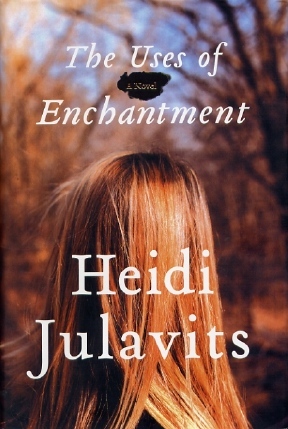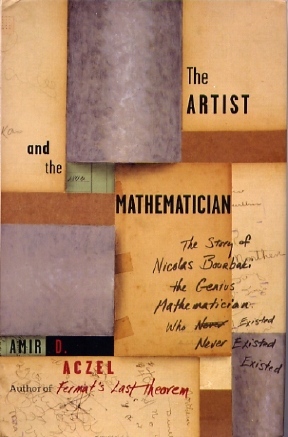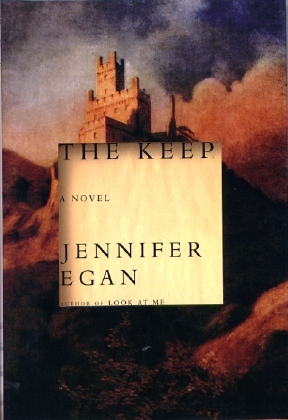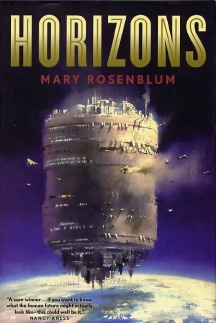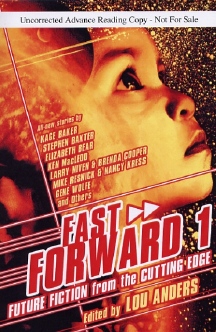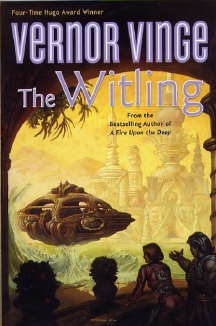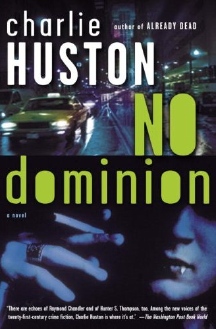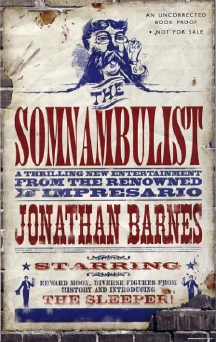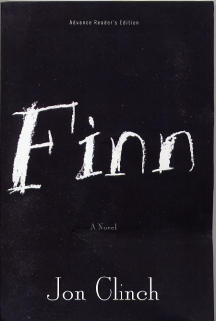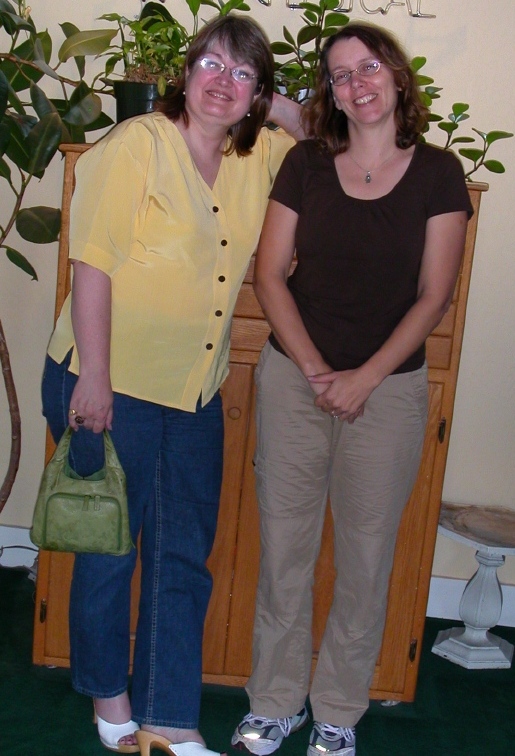|
|
|
This Just In...News from the Agony Column
|
12-08-06: A Review of 'The Uses of Enchantment' by Heidi Julavits |
|||
Ambiguity,
Anxiety and Abyss
As to what sort of novel this might be in terms of my favorite pastimes of pigeonholing and categorization, for a novel filled with ambiguity, it's a fairly straightforward call. This novel involves all the aspects of crime fiction and while it does offer more of a glimpse of the big-M Mystery than it does whodunit staples, it is first and foremost a mystery. Of course, you won’t find it shelved with the mysteries. I dream of the day when bookstores get cataloguing and shelving software and a store policy that wither allows them to put all fiction together mixed, or, probably better, slot the same book with different genres. Were you to be browsing the mystery section and come upon this novel, and buy it, you'd very likely enjoy it. It has a very nicely done mystery at the core of it and as a mystery it is superbly constructed. So for this particular reader, the first genre assignment goes to Mystery. Where you’re likely to actually find 'The Uses of Enchantment' shelved is with literary and what I call General Fiction. That's a good call. This novel is quite cleverly written and constructed. It takes all the tools of highfalutin litrachur and deploys them in a manner that readers of such works will enjoy. The real accomplishment of this book is that it uses these tools in a manner that pretty much everyone will enjoy, so long as you can stomach more than a soupcon of ambiguity. The sum is definitely more than the whole of the parts, but it is a sum, and the reader is going to have to be willing to do some addition. And finally, for me this is also a work of horror. It's mostly stays in the realm of terror, that is, a more abstract fear of some unpleasant fate, as opposed to a concrete fear of say, being vivisected. But Julavits takes tension to some enjoyably scary levels and works in her scares in a variety of fashions. Sure, we hope that Mary Veal, the kidnapped teenager at the core of the novel, is not going to reveal to us some sordid and ugly fate. But we're also scared for what will happen to Doctor Hammer, her psychologist, a man who finds himself faced with a problem he might be able to solve, but not resolve. The implications of what might happen or might have happened are consistently unsettling and disturbing. What’s really ace about all this fear is that in many ways, we know all the outcomes. But we also know that Julavits is going to take us on a journey to those outcomes, and the voyage through the past may not be as pleasant as the outcome in the future. Readers who think the novel is a horror novel due to the Salem witch connection are advised to seek witchery elsewhere; here, all you’re going to find is finely-honed bitchery. Once you've read the actual formal review, which I've posted here, you might want to listen to the interview I did with Julavits recently; it will be broadcast on NPR affiliate KUSP today, Friday December 7 at 10 AM PST. I'll be podcasting an unedited version Monday December 18 – one week from this Monday. It will give you some additional insight into the novel and a chance to hear Julavits' own, direct voice. It's not really present in the novel, not on the page. It is between the pages, it is the sum of the parts, it is the anxiety and the abyss that speaks and surrounds. Happy gazing! |
|
12-07-06: Murky Math Underlies Reality |
|||
A
Review of 'The Artist and the Mathematician' by Amir Aczel
But that was only because I'd forgotten my Fort, which suggests that even scientists are prone to be influenced by fashion. Aczels untangling of the murky business behind my New Math experience is a fascinating tale of how personality, politics and even art have an impact on our understanding of mathematics. To me, math has always seemed to be this crystalline entity, ever rigorous... ...but as I learned in Aczel's book, that rigor itself is the result of the non-rigorous routes that math takes to get important work done. Aczel does an excellent job building the characters of the two main players in the book, Alexandre Grothendieck and André Weil. Grothendieck is a fascinating figure, a genius who squandered his smarts when he got involved in politics in the late 1960's. I know that I watched riots he participated in on a black and white television while learning math as he and his comrades thought best. It's an odd world. If you're already conversant with the Bourbaki story, then it's possible that this book might not grab you like it grabbed me. I've only categorized it as non-fiction, as it really does not have any fictional content. On the other hand, I suspect that science fiction readers or writers might find it quite useful in understanding how science does or does not happen. One is forced to wonder where the Bourbaki of the new millennium might reside. What sort of technical curtain is drawn between the world of the developers and the world of the users? What do we perceive as a natural law that is the product of human invention? I was rather pleased that while 'The Artist and the Mathematician' dealt with quite a bit of fairly complicated math, it never actually forced the reader to do so. If you’re looking for a text about the actual math, this is not that text. But if you’re looking for a fascinating history of how math happens, then 'The Artist and the Mathematician' is the perfect choice. Here's my formal review, and here’s a link to an interview I did with the author. He is every bit as interesting as the people he writes about, but he is neither mad nor is he living in the wilderness by himself. There is a genius in the French Pyrenees, a man who rejected his talent and lost his way. This book will introduce you to that man; and he is not a character will easily forget. |
|
12-06-06: A Review of Jennifer Egan's 'The Keep'; 'Fast Forward 1' Edited by Lou Anders, Vernor Vinge 'The Witling, Charlie Huston 'No Dominion', Mary Rosenblum 'Horizons' |
|||||||||
Simple
Stories and Complex Lies
But 'The Keep' keeps all the cut-n-paste daring-do firmly on the surface, so readers can deal with it and in fact, even enjoy it. And reviewers can demonstrate their I-got-it-ness by writing reviews that might double as master's theses, a trap set by this particular novel I've attempted to avoid. So if you feel like you’re getting less plot summary than usual here, well there's a reason; I got the novel and a big part of the fun here is getting the novel, and the fact that it does not take a rocket scientist or a literary critic to do so. I'll let readers get the novel, and just try to say enough so as to indicate whether or not it is the sort of thing you as a reader might enjoy getting. And then there's the joy of pigeonholing this novel by assigning to a variety of genres. I'm going with Mystery first; yes, it is "Mystery" both in the sense of crime fiction and of the Big Mystery, but the Crime Fiction aspect really stands out. Then I'm going to slot it into General Fiction, because though it uses all sorts of genre tropes and situations, it is clearly a literary novel, though not the sort that wears its thesaurus on its sleeve. 'The Keep' is demonstrably a gothic novel and thus clearly a part of the Horror genre, though fear it engenders stems not so much from the gothic situations as it does from the crime fiction and most especially the meta-fiction conceits. And finally, I've also elected to include it as a Science Fiction novel, because it quite mercilessly and effectively employs the literary equivalent of the dimension-hopping technology in a manner that made me, at least feel as if it were an SF title. Readers are commended to read the novel first, but afterwards, I'd suggest hearing Egan talk about this novel in her own voice in my interview with her. She was pretty surprised pretty surprised by my admittedly peculiar observations, but not unhappy. And I suspect that if you enjoy this novel as much as I think you will, you'll enjoy the author as well. Commentary upon commentary and reviews as entrée into my reviews; 'The Keep' is the perfect novel for these sorts of shenanigans. But mostly, it's a lot of fun to read, and easy to read. It's short. It's a toe-tapping tale of terror. Don’t let the brilliant writing and structure hold you back. In fact, that stuff is so well done, it's practically invisible. |
|||||||||
Even
Faster Forward2.0
Earliest out of the gate is 'Horizons' by Mary Rosenblum (Tor / Tom Doherty Associates. We, that is my wife and I, have books in our house under both her names. As Mary Freeman, she writes Gardening Mysteries, (including 'Bleeding Heart', 'Garden View','Devil's Trumpet' and 'Deadly Nightshade') which gets her directly to the top of my wife's mystery stack. But for this column, we're looking at her science fiction, which I started reading back when I bought 'Synthesis and Other Virtual Realities' by virtue of the fact that it was an Arkham House book, an auto-buy publisher if ever there was one. 'Horizons' sports a very 1970's style cover by John Harris and a very post-millennial science fiction backbone. Modified humans circle the earth in orbit and wonder if they are indeed still human, while subject to very human impulses that include murder and even worse – politics. Rosenblum does not re-invent the wheel, but she does spin it well. Lou Anders is a gent we look to for Wheel 2.0. And in fact for 2.02.0, since we are sick to death of that bit of new-newness. But until he gets round to that, he does have his hands full, what with being the Editor of Pyr, so it’s not like he has a lot of time left to anthologies, right? Happily he does have the time, or at least is willing to make the time for 'Fast Forward 1' (Pyr / Prometheus Books ; February 2007 ; $15). And such a bargain! Yes, this is yet another New Science Fiction by sort-of-New Writers anthology series, and yes, we can pile these up and use them as one of them new-fangled orbital elevators that will be the de-rigueur cool tech for SF novels for the next umpty-ump months. (Not years – this is after 'Fast Forward 1' / SF 2.0!) There are a lot of the unusual suspects here, you know, must-buy, to-die-for names, including but not limited to Justina Robson, Elizabeth Bear, Tony Ballantyne, Robert Charles Wilson, Ken Macleod and Ian McDonald – but also some real you'd-never-expect 'em gems like Robyn Hitchock, everybody's favorite really weird musician. If the book includes a CD as well, or even just an MP3 push-n-play, then you'll know the future has arrived. Next stop, an anthology that includes a video game – and when that comes to pass, I expect that nobody will remember this article. Anthology 2.0! For the traditionalists among us, we have Vernor Vinge's 'The Witling' (Tor Books / Tom Doherty Associates ; November 28, 2006 ; $12.95). Even if you didn't miss this the first time around (1976; far too many of you were busy like, being born), Tor has sweetened the deal with fifteen full-page illustrations by Doug Beekman than do more than suggest that this novel might be the right kind of crack to hand someone you love who just needs to be addicted. It's true. If we don’t raise the next generation of crack cocaine addicts, who are we going to sell crack cocaine to? To my mind, there are few purer or more powerful varieties of crack than Vernor Vinge. 'The Witling' is a tale of survival on an alien planet when humans crash-land and find themselves caught between warring alien factions. But of course, one planet's wars are another planet's reality TV, so...be advised. Yes, we all know that there's a highly anticipated se/prequel out there in the realm of his imagination. But it's not like we can wait for years; here's a decent replay and a very good idea. Take your thirty year-old novel and don’t simply reprint it as a tatty MMPB, but give it new life as a decent Trade paperback with illustrations, value added. I guess we could call this 'TheWitling.2.0', but you know, that's so '05! And finally, what’s so '07 is Charlie Huston's 'No Dominion' (Del Rey / Random House ; December 26, 2006; $13.95). Sure, it’s appropriate to try to KILL THE UNDEAD by releasing the book THE DAY AFTER XMAS. I mean, fuck all. (And this obscenity is approved by Charlie Huston, who is an ace at deploying it in his fiction.) Who buys an over-the-top, violent, foul-mouthed, horrific, vampires-in-NY novel THE DAY AFTER XMAS? Sure, me, but that's beside the point. It should be you as well, though to be honest, first you'll HAVE TO READ 'Already Dead'. Listen to the interview I did with Huston not so long ago if you have any doubt that these novels are Worth Your Valuable Time. This time around, Joe Pitt, vampire PI is simply trying to mind his own bidnis when some psycho-fuck superman type goes off at a bar. What’s a vampire PI to do but say, "Fuck this shit!" and then proceed to get to the bottom of a very nasty conspiracy. Sweet, nurturing and happy conspiracies being in short supply in these books. So long as you find excessive gore and violence entertaining and really love obscene language taken into the realm of high-art, then this is clearly the book for you. Open this book to any random page and you're going to find explicit violence, the word "fuck", or a blood-spattered scene of post-violence repose. Or multiples of all three. If that does not sound like a recommendation to you, then perhaps you need to move your personality along and become a better person. I mean, we can all be better people if we just change all the bad stuff about us. I KNOW that every single person reading this column has someone in their life with LOTS of advice as to how to be a better person. Ad I bet most of them heartily approve of reading books where usage of the word "fuck" is elevated to an artform. So long as it leads to You2.0...well, just give me the executive summary after the meet-and-greet reception in some swank hotel, OK? Rick Kleffel 0.7 is a couple of revs behind and not so willing to pony up the dough for an upgrade. We're into cutting edge literature and trailing edge technology. |
|
12-05-06: A Glance at the Future's Past |
||||||
'Finn'
by Jon Clinch and 'The Somnambulist' by Jonathan Barnes
'The Somnambulist' is the tale of Edward Moon, a stage magician and detective, a sort of proto-Penn accompanied by a proto-Teller, The Sleeper. But it's not a simple story simply told. No, no, no. Barnes is up to something considerably more complex and much funnier. Told in the a scabrously silly first person voice, 'The Somnambulist' is New Victoriana after way, way too much laudanum, a hallucinogenic tale of plots to conquer the world and one uproarious joke after another. The style is so far over the top it's come back round from underneath, and the story is so bizarre it could get a stand in any freak show the far side of 1900. Anything afterwards might find 'The Somnambulist' too dicey. I suspect that readers of this column will love it to death, and probably beyond.
We'll be looking more closely at these novels as they get closer, but make no mistake about it. Put these on your early-order list and make sure to get signed first editions if at all possible. Your literary future promises to present some persuasive portraits of the past. Americana and Victoriana. And as we plunge headlong towards tomorrow, our hindsight becomes ever clearer, ever more compelling. Perhaps we should listen carefully. |
|
12-04-06: Idea Soup |
||
A 2006 Interview With Kate Elliott and Melanie Rawn, Part 1
I had the great pleasure to have not just an interview with Kate Elliott and Melanie Rawn, but lunch as well, on the wharf at Santa Cruz, on a gorgeous day when sea lions swam beneath us on the sun-glinted ocean. It was not to put too fine appoint upon it, magical. My wife joined us and we talked about everything but their books, and very successfully I might add. This is pretty difficult. Generally speaking, I've learned not to ever speak too much to an author before I get them in the studio, lest they say something extraordinary that doesn't get on tape. But Kate and Melanie chatted with my wife and I about all the various places we lived, our kids and compared the dueling beaches of Santa Cruz and Hawaii. It was everything but the really, really great stuff, which they managed to save for the interview. We ran for well over an hour, and that's understandable, since I was talking to two of fantasy's smartest and most prolific authors. I'm going to podcast the interview in two parts, on this week, one next week, and trust me they're both packed with goodness. I even took two different photos of them and I just twigged to the fact that I can use one with each podcast article. Readers can pick up an MP3 file or a RealAudio file of the first part now. Or you can just subscribe to the podcast. Yes, I did ask them if they wrote girly books, and got some pretty interesting answers. But that was just the beginning. I'm going to be smart enough to let them speak for themselves. Sit back and enjoy the sound of two wonderful woman writers on the road and having fun, driving down to Santa Cruz and listening to the Beatles. Does it get any better than that? You'll have to tune in to part two to find out! |
